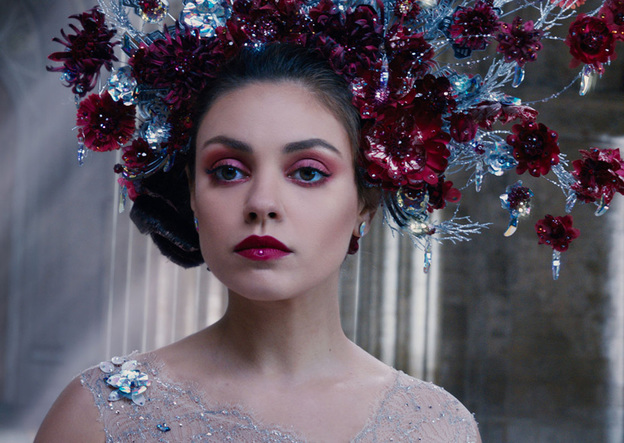|
SET to an impressive cosmic backdrop, the Wachowskis ambitious space opera Jupiter Ascending explores the themes of corruption, power and greed.
A humble Russian cleaner Jupiter Jones (Mila Kunis) discovers that, due to random genetic reincarnation, she is heir to Earth. Jones’s inheritance comes as unsettling news for the House of Abrasax, a family of crazed alien royalty. The enraged Balem (Eddie Redmayne), Kalique (Tuppence Middleton) and Titus Abrasax (Douglas Booth) collectively want Jones dead so they can reclaim Earth. Titus hires a genetically engineered man-wolf hybrid known as Caine Wise (Channing Tatum) to locate Jones. Yet, in a twist reminiscent of The Huntsman from The Grimm’s Snow White 1919 fable, Wise refuses to kill her. Instead he whisks her away on his hover boots and they embark on an intergalactic quest to save the Earth from the Abrasax dynasty. Whilst it is satisfying to see yet another female hero grace the silver screen, which is an emerging trend in Hollywood, especially after the success of kickass heroine Katniss Everdeen (Jennifer Lawrence) from The Hunger Games (2012-) franchise, Jupiter Ascending offers a rather lousy female lead at best. Jones succumbs to the lacklustre damsel archetype. Seemingly in perpetual danger, her naïveté and gullible nature makes her vulnerable and an object to be rescued. The character lacks motivation and Jones stumbles at the heels of every guy she meets. This results in awkward spouts of romantic dialogue with Caine, only to then bizarrely develop affections for Titus just scenes later. A heroine should be strong, independent and feisty and, whilst Jones may be foxy, she is nothing more than a passive damsel in distress. “Bees can’t tell lies”, proclaims ex-military soldier Stinger (Sean Bean). It is a comedic moment, despite this scene being delivered in complete sincerity. Stinger’s exclamation, which borders on absurdist conspiracy theory, is simply outlandish. Unfortunately for the directors, audiences are not as gullible as the film’s lead protagonist, Jupiter Jones, and moments like these run the risk of ruining the diegesis by pulling the audience out of the story. Regardless of its futuristic setting, where potentially anything is possible, certain details are often too far a stretch of the imagination and, consequently, the film becomes less accessible. Yet the film does have redeeming features. John Toll's breathtaking cinematography deserves recognition. In particular, the innovative interior and exterior decorations of the spaceships, cathedrals and other lavish locales provide exciting backdrops for the choreographed action sequences. The impressive CGI universe does, unfortunately, receive little attention in favour of the dreary dialogue. Whilst there are certainly visually immersive moments, such as watching a swarm of bees coil around Jones, the absurdness of the plot is indeed distracting in its silliness and plunges the film into comedic territory. The plot constantly has to be explained to the weak protagonist who, much like the audience, is confused by the unfolding events. In an age of adaptations, sequels and reboots, Jupiter Ascending stands out as something of an original science fiction film. Yet, despite its originality, some of the concepts and story lines may seem familiar. The idea of humans being grown in test tubes and harvested as a resource is an idea that has been previously visited by the Wachowskis in The Matrix (1999). The Keepers, a misfit group of alien hitmen contracted by Balem, look like they have just walked off the set of Doctor Who (2005-); they bear an uncanny resemblance to the ghoulish alien religious order The Silence. This mash-up of ideas, styles and themes problematises the originality of Jupiter Ascending and, as beautiful as the visuals may be, they are not enough to distract from the film’s feeble protagonist and tedious plot. |


